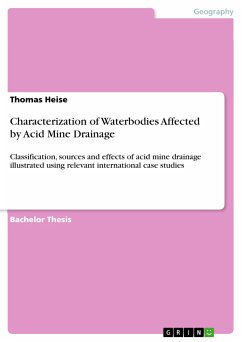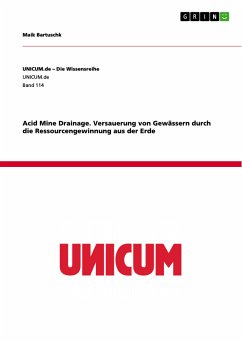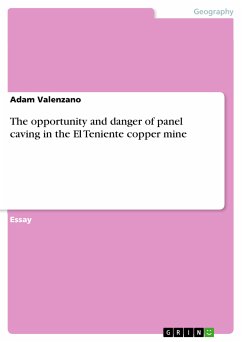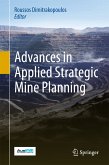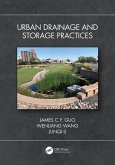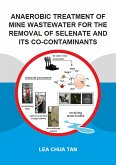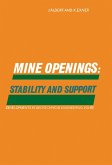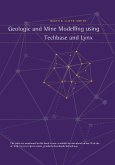Bachelor Thesis from the year 2010 in the subject Geography / Earth Science - Geology, Mineralogy, Soil Science, grade: 1,0, , course: Montanuniversität Leoben, language: English, abstract: Water is a natural resource of high significance for human beings, fauna and flora. Therefore, the protection of water resources is one of the highest aims of each industrial site. The mining sector and its subsectors have a lot of applications for water, also causing a high potential to interfere with water systems. Mineral extraction, mineral resource storages, mineral processing and mine waste storage form important potential pollutant emitters. The weathering of sulphidic minerals cause the most severe mine-water-related problems, because it involves a decrease in the pH level as well as an increase in dissolved total solids, especially metal concentrations. This acid mine waters are categorized as acid mine drainage. The drainage of acidic water represents the biggest conflict between mining and environment in the world. This thesis deals with the characterization of waterbodies impacted by acid mine drainage. A discussion of the fundamental processes forms the basis of this paper. The classification of mine drainage, the weathering of pyrite and potential pollution sources are discussed in detail. However, impacts of acid mine drainage, drinking-water-specific values and legal and political aspects are mentioned as well. Based on this theoretical part, various international, especially European case studies will be reviewed. Each of these examples includes a brief introduction to the general mine-water related situation and with a focus on a specific development of the site, thus ensuring to illustrate the complexity of this environmental concern. Finally, a conclusion is drawn from the discussion of the case studies, complementing the theory part.
Dieser Download kann aus rechtlichen Gründen nur mit Rechnungsadresse in A, B, BG, CY, CZ, D, DK, EW, E, FIN, F, GR, HR, H, IRL, I, LT, L, LR, M, NL, PL, P, R, S, SLO, SK ausgeliefert werden.

